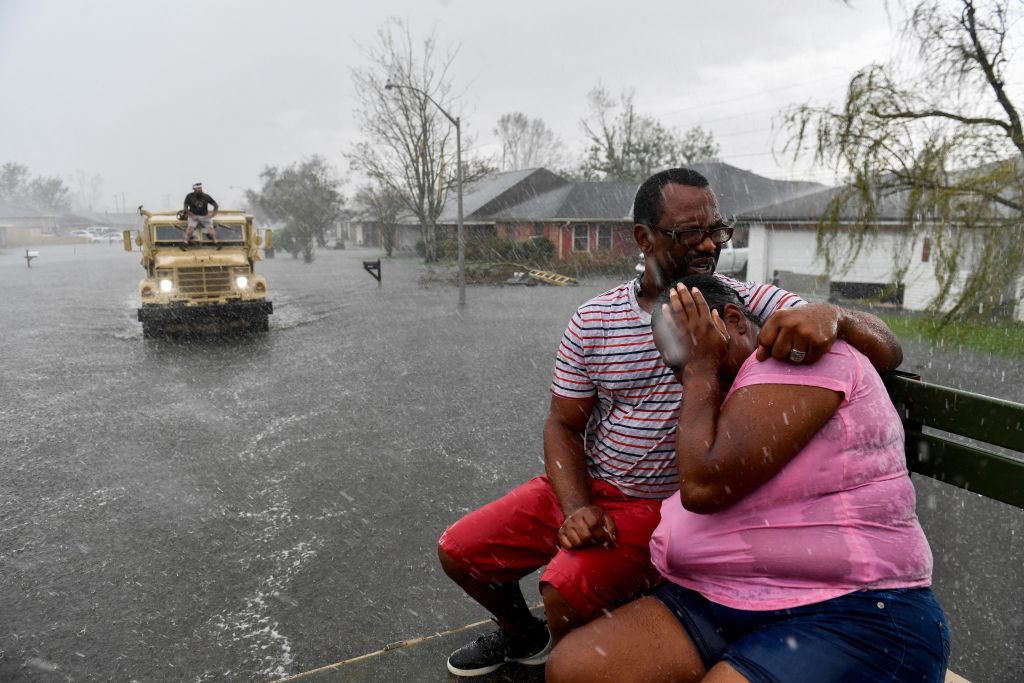5 Ways Climate Change Directly Affects Black People
The myriad ways in which climate change affects Black people, in particular, is coming into sharper focus as President Joe Biden attends the COP25 United Nations Climate Change conference in Glasgow.
Discussing ways to protect the world’s environment, the president has been championing the creation of cleaner energy through The First Mover’s coalition, which is comprised of some of the leading companies in innovation and technology that are looking to build renewable energy resources to help solve climate change’s drastic effects. The group is expected to help offset the need for excessive amounts of electricity, which is often powered by coal, another harmful pollutant to the environment. According to the U.S. Energy Information Administration, coal was the third-largest energy source for U.S. electricity generation in 2020—or about 19 percent.
MORE: Biden Administration Says Infrastructure Deal Prioritizes The Black Community
Biden was also scheduled to announce his administration’s first government-backed initiative to conserve the global forest. The decade-long plan will focus on “preserving critical carbon sinks, like coastal ecosystems” and hold big energy-guzzling nations accountable for global warming. Biden said he hopes that these changes will help to prevent future generations from feeling the worsening effects of climate change.
So, you might be asking yourself at this point: What exactly does any of that have to do with Black people?
The answers are actually more intuitive than you might think.
People react as a sudden rain shower soaks them with water while riding out of a flooded neighborhood in a volunteer high water truck assisting people evacuating from homes after neighborhoods flooded in LaPlace, Louisiana on August 30, 2021, in the aftermath of Hurricane Ida. | Source: PATRICK T. FALLON / Getty
Voter Suppression
While voter suppression can often be caused by the manipulation of election rules like imposing strict voting requirements and misinforming people about key voting dates, climate change can also have a severe impact on the voting process, especially in the aftermath of severe storms or natural disasters. No electricity means voting machines are less likely to be functioning. New Orleans, for example, has struggled to recover following the aftermath of Hurricane Katrina. The majority-Black city was pummeled yet again when Hurricane Ida ravished the southeast with flooding, gusty winds and torrential rain back in August. Polling locations are likely closed when environmental incidents occur, dates are often pushed back without notice and little updates are given on when polling sites are back up and running. People can receive absentee ballots in lieu of physically placing their votes, but how do you do that if you’ve been displaced during a natural disaster? Likewise, how do ballots get sent out if the postal system is affected by a natural occurrence? This is the problem.
The upcoming election in Louisiana, which is now rescheduled for Nov. 13, will give citizens the ability to vote on four constitutional amendments that will impact tax laws. But with the Bayou State struggling to rehabilitate after Ida, along with the ongoing COVID-19 pandemic, the number of voters who actually make it to the polls is uncertain.
Environmental Issues Place Black People’s Health At Higher Risk
Black people are more likely to live in low-income communities that are closer to industrial facilities that release toxic emissions. According to a report conducted by the National Association for the Advancement of Colored People (NAACP) and the Clean Air Task Force, “Blacks are 38 percent more likely to be exposed to air pollutants than whites.”
For those suffering from asthma, air pollution can make the condition worse. Black people with asthma are three times more likely to be hospitalized or die from an asthma attack than whites, the report noted. Climate change can often lead to water pollution which could cause other life-threatening conditions for Blacks, including cancer and respiratory disease. Black people make up a majority of the South in the U.S.– an area that is often plagued with deadly heatwaves and vicious storms. Many people of color are often hospitalized, or in extreme cases, die from these environmental issues.
Source: Bill Pugliano / Getty
Climate Change Linked To High Rates Of Crime
According to a study conducted by The Washington Post, “more than 2 million major crimes were committed between 2001 and 2012″ in Chicago, and air pollution was to blame for them. The data was compiled after research discovered that deadly air currents from vehicles were blowing into communities south of the city’s I-290 highway.
Black people breathe in “particulate matter” which includes diesel exhaust chemicals 56 percent more than other communities due to where they live. Air pollution has been linked to changes in the brain which could lead to people exhibiting more aggressive and violent behavior, the University of Minnesota notes.
Education
Environmental factors can displace millions of students preventing them from attending school. In the case of the COVID-19 pandemic, students were forced to switch over to online courses in order to continue their studies. But for many communities of color, the technology leap wasn’t so easy. Some households did not have access or could not afford digital tools such as computers or portable devices to maintain their children’s studies. Often times schools are turned into shelters during extreme storms. Educational establishments can be slammed with unprecedented damage, causing children to temporarily miss out on school.
Source: NurPhoto / Getty
Employment
Climate change affects employment statuses significantly regardless of one’s racial background. But because Black people disproportionately work blue-collar jobs outdoors and in hot indoor environments, they “are at increased risk of heat stress and other heat-related disorders, occupational injuries, and reduced productivity at work,” according to a report published by the U.S. Department of the Interior.
SEE ALSO:
Biden Administration’s Environmental Justice Initiative Kicks Into Gear
Black People Face Deadliest Risk From Climate Change Effects Like Hurricane Ida, EPA Report Confirms
[ione_media_gallery id=”3944536″ overlay=”true”]

